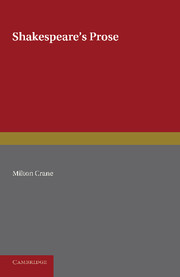I - Shakespeare and Dramatic Prose
Published online by Cambridge University Press: 05 June 2016
Summary
Jaques. Nay, then, God b'wi' you, an you talk in blank versel
Shakespeare's prose is beyond question the finest body of prose by a writer in English. The idea may at first appear strange; one grants that Shakespeare wrote prose, but one may hesitate to admit him to the company of prose writers, for, after all, he wrote dramatic prose. Any roster of artists in English prose is likely, however, to include not only novelists but historians, biographers, critics, philosophers, scientists, and theologians—and who would take it upon himself to exclude Congreve or Shaw? And Shakespeare leads them all. His prose is the richest and most various in the language; it draws its greatest strength and suppleness from the fact that it was written to be spoken by characters in plays. At its best, it contributes enormously to the depiction of personality, and it is an indispensable element in the creation of atmosphere. And even at its least interesting, as in the journeyman scenes of exposition, it is less obtrusive than the purely utilitarian verse, which can range from neutral to downright distressing.
It was Shakespeare's good fortune to write prose in an age which made no sharp stylistic demarcation between literary dramatic prose and the prose of common speech. Like John Middleton Synge, Shakespeare was free to draw on the prose of the city and hamlet for its vigorous natural rhythms and its unconscious beauty. We may imagine, with Bernard Shaw in The Dark Lady of the Sonnets, that Shakespeare assiduously jotted down for later use the felicitous phrases of beefeaters; but whether or not we commit ourselves to such a theory, we can hardly fail to recognize, in the excellence of Falstaff's prose, Shakespeare's delighted awareness of Elizabethan speech. The racy language of the London streets figured significantly in the development of the finest dramatic prose that our language—or any other—has ever known.
Prose has for so long been the unquestioned medium for English drama that one conceives only with difficulty of a truly popular drama in verse, or in a combination of prose and verse. Yet the ascendance of dramatic prose is a relatively recent phenomenon, as the history of European drama demonstrates; prose first found its way into the verse play by fulfilling certain functions which dramatists were for some reason unwilling to delegate to verse.
- Type
- Chapter
- Information
- Shakespeare's Prose , pp. 1 - 8Publisher: Cambridge University PressPrint publication year: 2013



